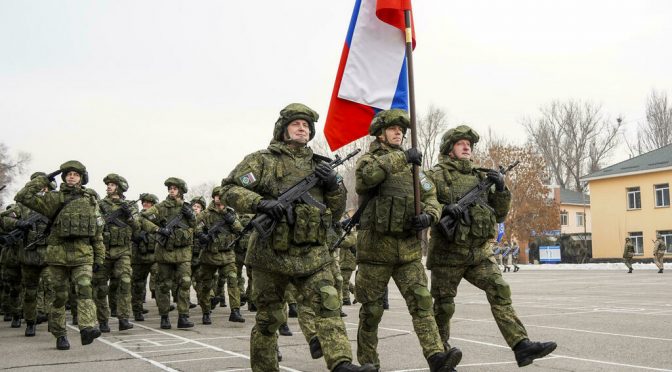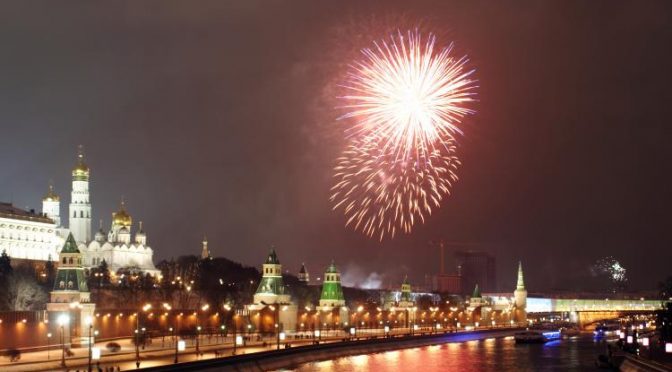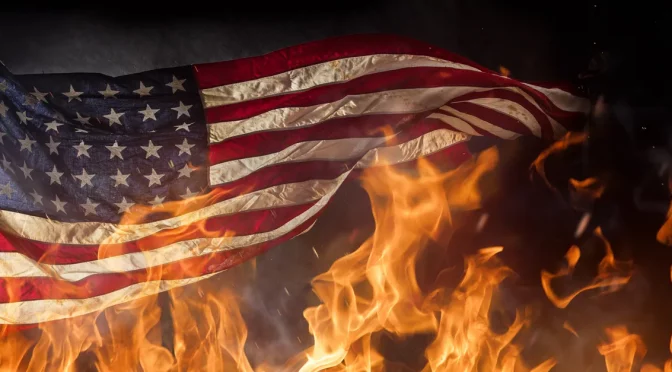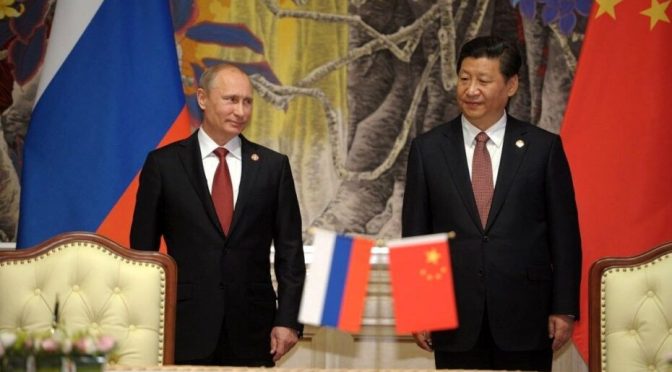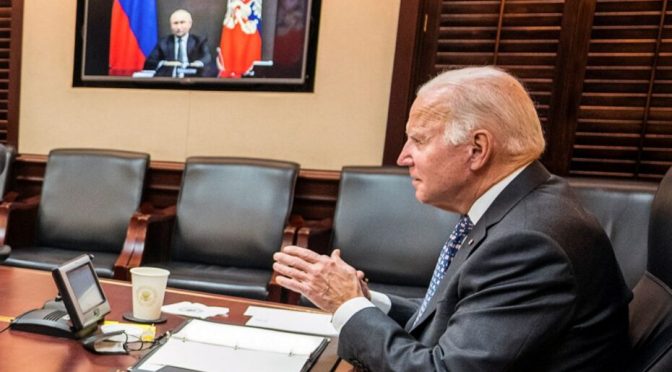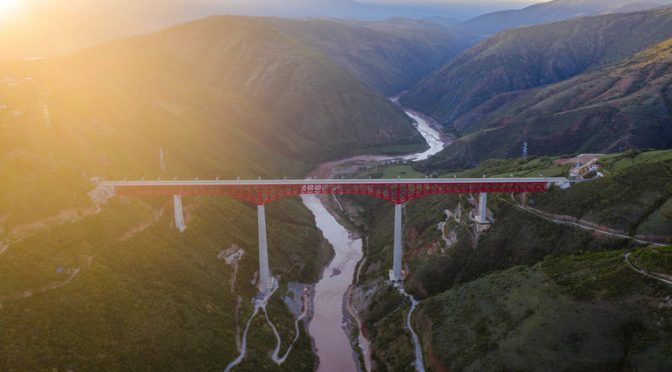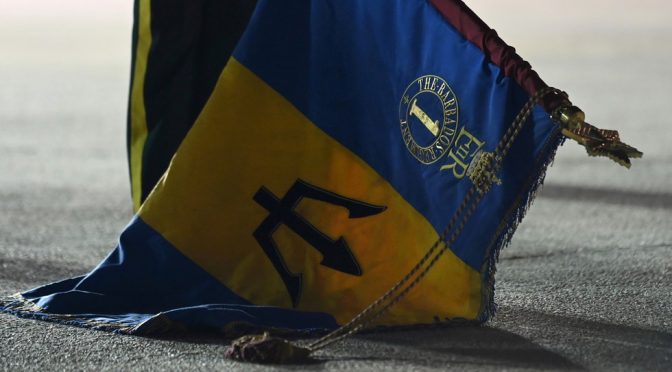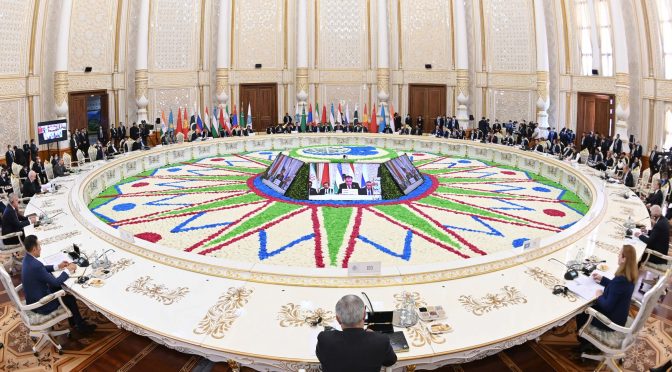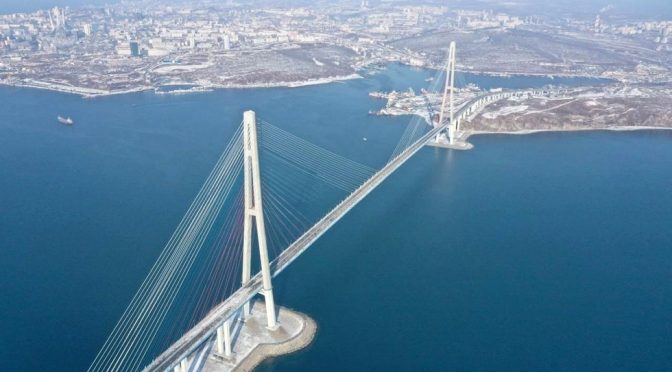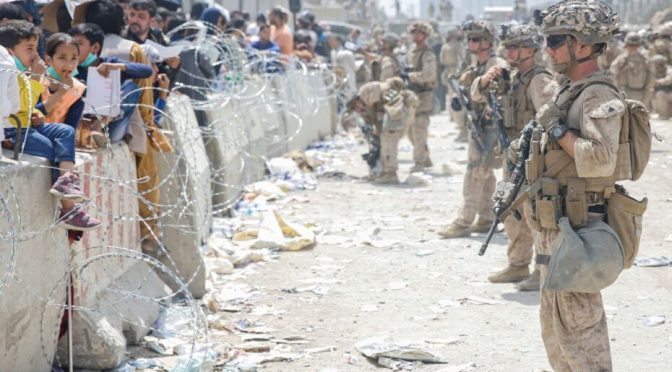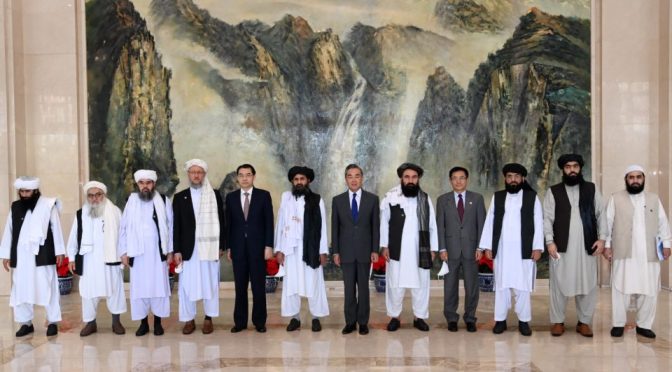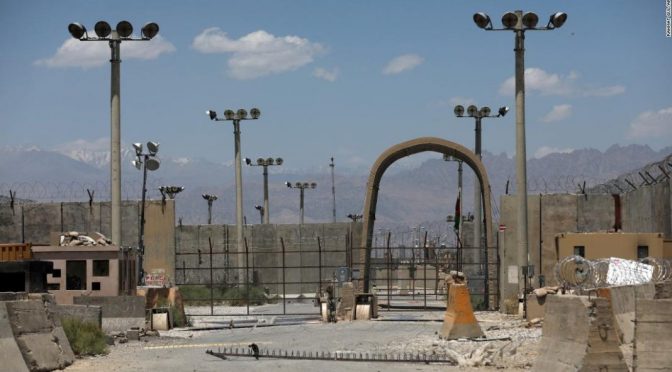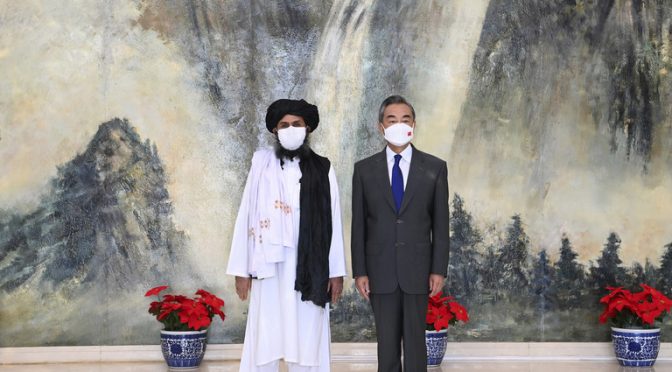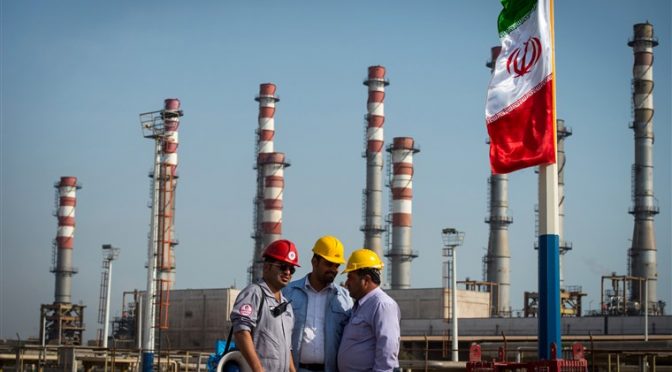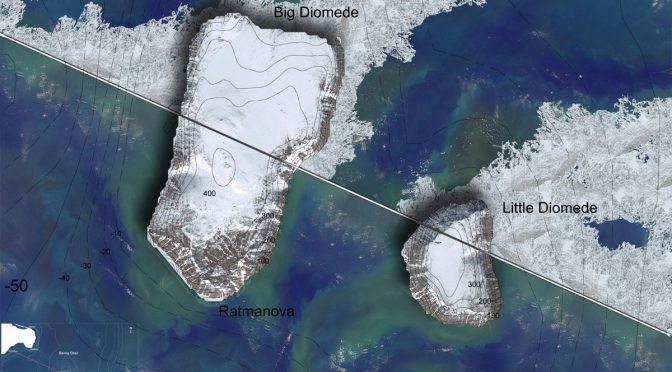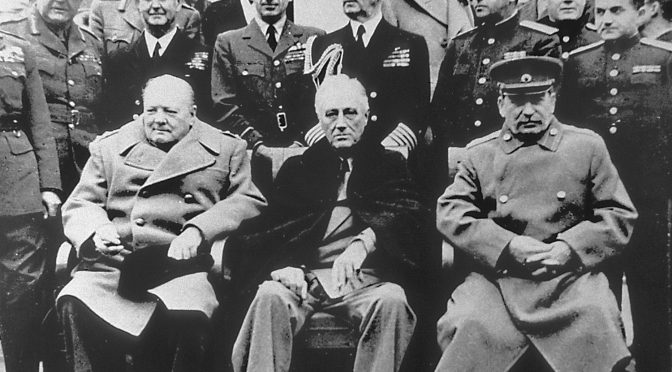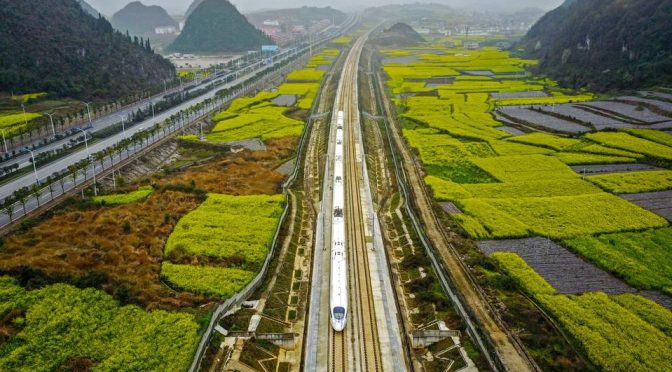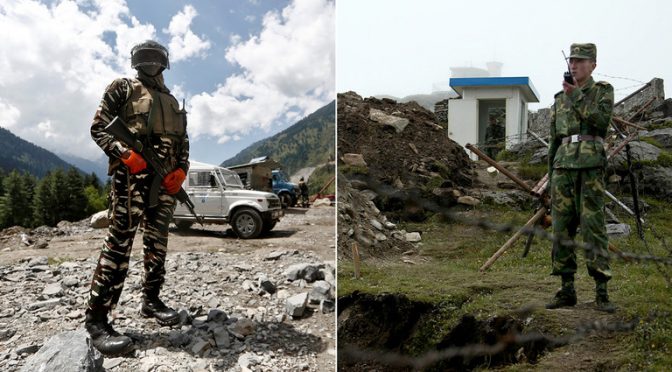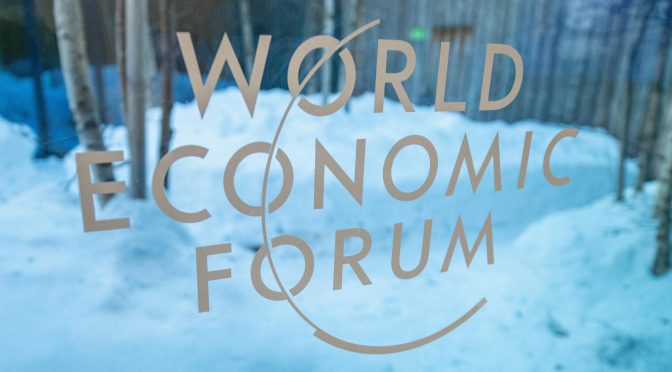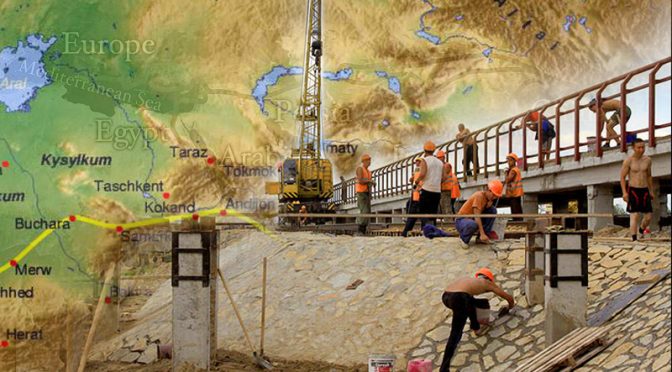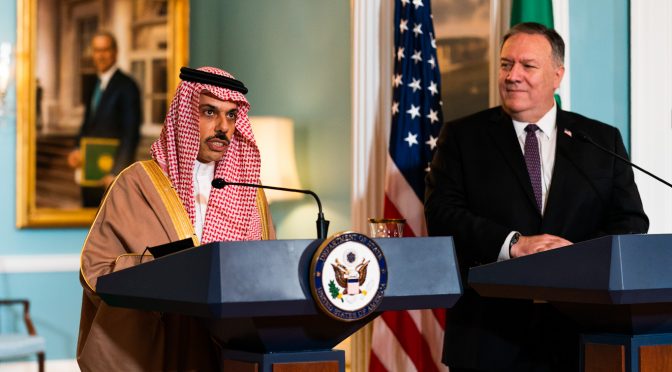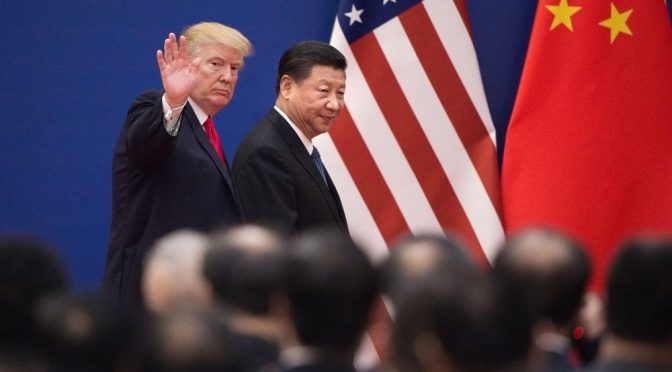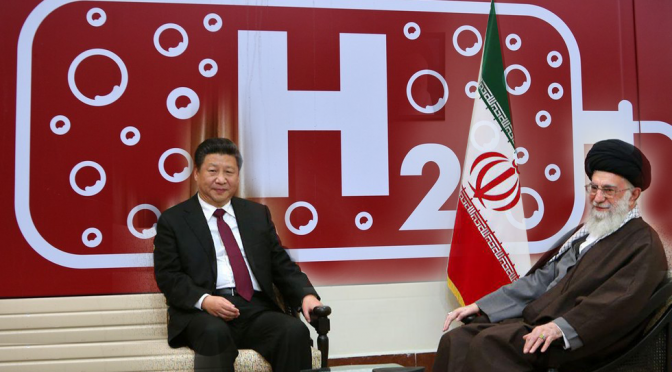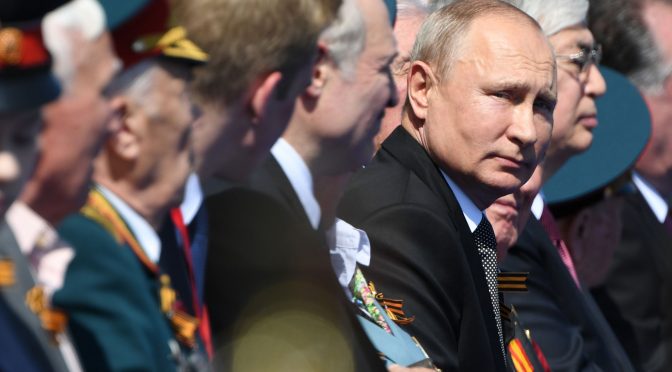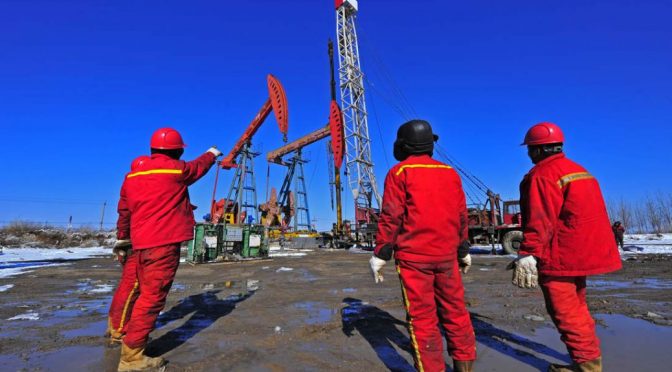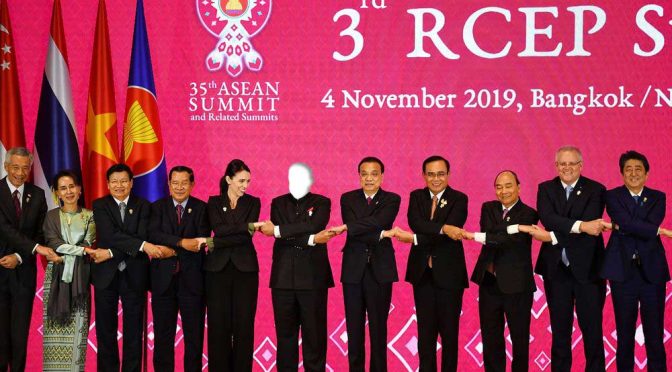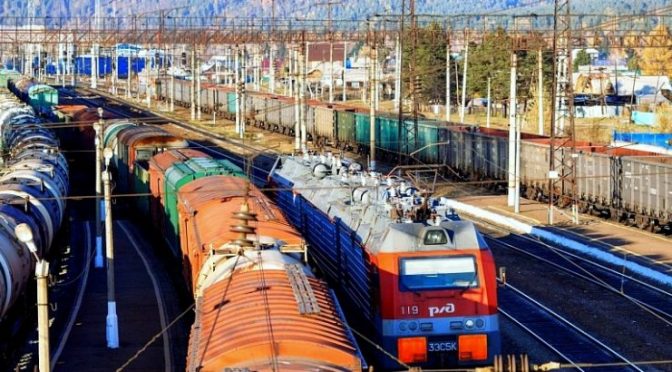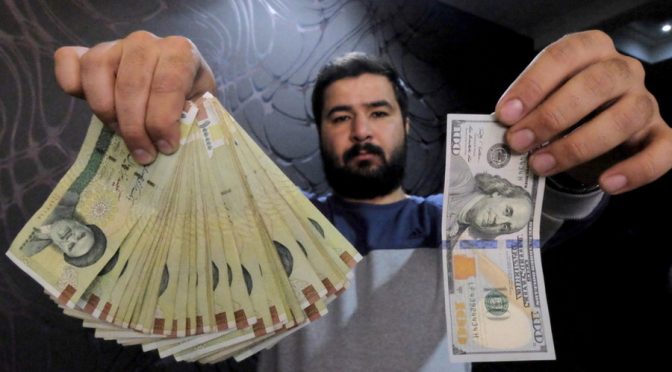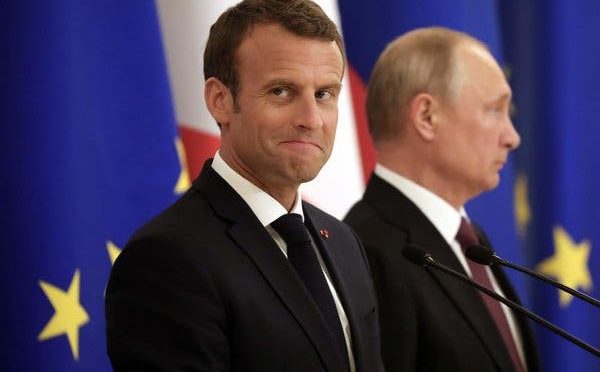The US went into overdrive in propagating against the short Russian-led peacekeeping operation in Kazakhstan under the Collective Security Treaty Organization (CSTO) mechanism. The Wall Street Journal speculated whether “the Crisis in Kazakhstan [was] the Rebirth of the Soviet Union” and US Secretary of State Antony Blinken said on Friday that “one lesson of recent history is that once Russians are in your house, it’s sometimes very difficult to get them to leave.”
Continue reading Blinken Humiliated after Announced Withdrawal of Russian-led PeacekeepersCategory Archives: Multipolar World
January 2022: A Game Changing Moment Between Russia, America and the World
What Moscow is really asking for is to redraw the borders of influence between Russia and the West.
Continue reading January 2022: A Game Changing Moment Between Russia, America and the WorldIt’s Time to Prepare for The Post-American Age
Washington’s role in the world is diminishing. What comes next?
Continue reading It’s Time to Prepare for The Post-American AgeCheckmate: Iran Is Spearheading a Geopolitical Sea Change in West Asia
Benjamin Franklin once famously wrote to his fellow colonials: “Either we hang together or we hang separately.”
Continue reading Checkmate: Iran Is Spearheading a Geopolitical Sea Change in West AsiaAre Sino-Russian Relations Really the ‘Best in History’?
They are certainly positive and can be like a breath of fresh air compared to the eternal stench from the swamp Washington has been sinking into.
Continue reading Are Sino-Russian Relations Really the ‘Best in History’?Never a More Unsettling Strategic Landscape
It is the first time that others are dictating to the West rather than being instructed on how to conform to American red lines.
Continue reading Never a More Unsettling Strategic Landscape‘The country that bombed you is your friend. The one that built your new railway is your enemy’
This is the Western media’s bizarre messaging to the people of Laos, a nation that was carpet bombed by America, and which is now being vilified for accepting a new $9 billion railway line paid for by China.
Thursday was National Day in Laos, a celebration marking 46 years since the landlocked Southeast Asian nation deposed its monarchy and became a revolutionary communist state, an effort which was supported by Vietnam.
This year, the anniversary had added significance, as it saw the opening of a major new project, an electrified high-speed and freight railway system connecting the capital city, Vientiane with its northern neighbour, China.
The $9 billion project is part of the Belt and Road Initiative, and has been hailed as one of its flagship achievements. It is the first commercial and industrial railway in Laos, which, given its geography and the fact it is surrounded by mountainous terrain, has not previously had many options to expand its exports and generate economic growth.
Now, though, it has a direct rapid link into the world’s second largest economy and the world’s largest consumer market by population, and a connection to the booming ports of Guangdong. In terms of what it will bring to Laos, it is a game changer. So, what’s not to like about it?
To nobody’s surprise, the mainstream media have responded to the railway with the usual anti-China negativity. A plethora of articles sought to paint the project as a ‘debt trap’, promoting the accusation that Beijing loans countries money for projects they cannot afford and then exerts political leverage over it.
The Financial Times, for one, ran with a cynical article headlined ‘Laos to open Chinese-built railway amid fears of Beijing’s influence’. It implied that somehow Laos feels threatened or fears the construction of this very pioneering railway project (which the country’s own leader made sure he was the first to travel on). This suggestion of ‘fears of Chinese influence’ has become a common feature on such stories, which seek to cast doubt over anything positive China may be achieving or doing.
A common Twitter meme among pro-China users which has followed from stories like this asks: “but at what cost?” highlighting the frequency of such negative coverage.
And if you Google “China, but at what cost?” you can find a great many examples of articles published in major outlets. In producing such pieces, the broader intention is to depict Beijing’s actions as unwanted, threatening and constantly facing opposition. In the case of the Laos railway project, the ‘problem’ is it was financed by debt, and therefore it is not a positive step.
Yet this argument is as insulting as it is outright insensitive to Laos’ contemporary history. Anyone who knows anything about Laos’ relatively recent past will be well aware that China is not the country to fear, but the United States – the nation that dropped over 260 million cluster bombs on Laos and completely devastated the country as an extension of the Vietnam War, making it the most single bombed nation in history and claiming over 50,000 lives.
Many of these bombs remain unexploded and litter the countryside of Laos, continuing to kill civilians. In constructing the new railway, workers first had to clear the unexploded ordnance. How is it that the world and the mainstream media remain indifferent to this atrocity? And how, by any stretch of the imagination, can they claim that China is the true threat to Laos, and that the US and its allies act in the true interests of the country?
Herein lies the problem. Such a mindset symbolizes the elitism, chauvinism and self-righteousness of the countries of the West, which are ideologically inclined to believe that they stand for the ‘true interests’ of the ordinary people in the countries they profess to liberate.
Western politics peddles the assumption that through countries’ adherence to liberal democracy, they exclusively hold a single, universal, impartial and moralistic truth, derived from the ontological legacy of Christianity, and they have an obligation to introduce it to others. The West always acts truthfully and in good faith, while its enemies do not. And therefore, so the logic goes, any policy the US or its allies direct towards Laos is motivated by sincere intent and goodwill for its interests, and in turn, anything that China does is bad-faith, expansionist and power-hungry behaviour motivated by a desire to influence or control the country.
This creates the bizarre scenario whereby Beijing is depicted as evil and sinister for building a railway to connect to its neighbour – but we should forget America dropping millions of bombs on the country because it was done in the name of ‘freedom’. I’m sure you can imagine how the media would react if China did the latter.
Those who push this narrative predictably omit any insight into how Laos itself thinks about the situation. Another piece which took a similar stance, published in The Diplomat, was titled ‘Laos-China Railway inaugurated amid mounting debt concerns’.
But like the ‘fears of Beijing influence’ expressed in the FT, who are these ‘concerns’ from? The report cites the “Washington-based Center for Global Development” and what it merely describes as a “US based analyst” as sources who push the ‘debt trap’ narrative. But nowhere in any of these articles is there an actual voice direct from Laos who raises any fear of China, or objects to the railway’s existence.
Instead, they simply talk on the country’s behalf, obscuring the reality that a communist state which suffered from extreme levels of aggression from the US probably does not see its northern neighbour – and its most important economic partner – as a threat to its regime. With many more articles running variations of the same theme, there is minimal effort given to the consideration that the railway will help the country rapidly expand its exports, sustain greater growth and help Laos pay for the project.
The Laos-China railway has provided a textbook example of how the media can distort a story in order to fortify an incriminating narrative, while brushing aside brutal realities. We are shown a lopsided world, where the travesty of a country being bombed into oblivion with consequences lasting decades is ignored, and the preference is to try to convince us how that same country’s first commercial railway line is, in fact, what it should really be scared of.
It is a demonstration of how the power of the English-language, pro-US media distorts reality itself and how they can blow up an issue, yet hide the truth, by professing to care dearly about the well-being and interests of a country which the West poured death, destruction and carnage upon in the name of freedom.
Barbados Ditches the Queen
If you believe the narrative being pushed in the UK media, there’s a predictable source to blame for Barbados going it alone as a republic. This speaks volumes about the UK’s uncertainty over its place in the shifting world order.
Continue reading Barbados Ditches the QueenA New Future Dawns in the East
A shift in the world’s power base, alliances and economic strength, will undoubtedly happen within the coming years. In fact, it’s already ongoing. But not necessarily according to Klaus Schwab’s (WEF) “The Great Reset”.
Continue reading A New Future Dawns in the EastHow the SCO Just Flipped the World Order
As a rudderless West watched on, the 20th anniversary meeting of the Shanghai Cooperation Organization was laser-focused on two key deliverables: shaping up Afghanistan and kicking off a full-spectrum Eurasian integration.
Continue reading How the SCO Just Flipped the World OrderUnited Eurasia: Russia is Betting the Days of Total U.S. Economic Supremacy are Ending
The centre of the world is moving. While once it sat somewhere within the Atlantic, balanced between Europe and the US, it is now moving east. With Asia on the rise, Russia is now planning its role at the heart of two continents.
Continue reading United Eurasia: Russia is Betting the Days of Total U.S. Economic Supremacy are EndingA ‘Strategic Apocalypse’ in Afghanistan: A Seismic Shift, Years in the Making
A huge geo-political event has just occurred in Afghanistan: The implosion of a key western strategy for managing what Mackinder, in the 19th century, called the Asian heartland. That it was accomplished, without fighting, and in few days, is almost unprecedented.
Continue reading A ‘Strategic Apocalypse’ in Afghanistan: A Seismic Shift, Years in the MakingAfghanistan to be Integrated into China’s “Belt and Road”
There’s a reason why the Talibans are not rampaging inside Kabul to celebrate their victory over the US military — Afghanistan’s economic cooperation with China via the Belt and Road Initiative will be in full swing.
Continue reading Afghanistan to be Integrated into China’s “Belt and Road”Requiem for an Empire: A Prequel
The inexorable imperial rot will go on, a tawdry affair carrying no dramatic, aesthetic pathos worthy of a Gotterdammerung.
Continue reading Requiem for an Empire: A PrequelRussia Seeks to Deepen Cooperation with Islamic World
Valentina Matviyenko pointed out that Russia vividly demonstrated the immense creative potential of living together in peace and harmony, and in close contact with members of different nationalities, religions and cultures.
Continue reading Russia Seeks to Deepen Cooperation with Islamic WorldA New Great Game is Afoot in Afghanistan, as China Hosts the Taliban
The inviting of a delegation from the Taliban Islamic fundamentalist group to Beijing this week has raised eyebrows across the world. Is China being clever, or does it face grave dangers on entering the “graveyard of empires”?
Continue reading A New Great Game is Afoot in Afghanistan, as China Hosts the TalibanChina Mega Investment Deal With Iran Blows U.S. Out of the Picture
China has just announced that it will invest 400 billion dollars in Iran over a period of 25 years in exchange for a great deal on Iran’s oil – in the latest move of absolute defiance against the U.S. and its secondary sanctions. Where’s this all heading?
Continue reading China Mega Investment Deal With Iran Blows U.S. Out of the PictureThe US-Russia Bering Strait Rail Tunnel Project
In a recent paper entitled ‘Tomorrow’s Arctic: Theatre of War or Cooperation?’ I introduced readers to the US-Russian grand design which shaped not only the sale of Alaska in October 1867 to the USA for $7.5 million, but also Russia’s involvement in the American Civil War as Czar Alexander II arranged the deployment of Russian military fleets to San Francisco and New York.
Continue reading The US-Russia Bering Strait Rail Tunnel ProjectThe Multipolar Alliance as the Last Line of Defense of the UN Charter
The question should be asked: was FDR’s intention to dismantle the British Empire only a ruse to create the Anglo-American special relationship in a new US-led reconquest of the world, or was his plan genuine?
Continue reading The Multipolar Alliance as the Last Line of Defense of the UN CharterThe Dynamics of Nuclear Power Diplomacy: Russia and China vs the Neo-Malthusians
Today’s Green New Deal and G7 Green anti-BRI vision have at their heart this profound misanthropic view of humanity weaved into their programming.
Continue reading The Dynamics of Nuclear Power Diplomacy: Russia and China vs the Neo-MalthusiansHow Eurasia Will Be Interconnected
The extraordinary confluence between the signing of the Iran-China strategic partnership deal and the Ever Given saga in the Suez Canal is bound to spawn a renewed drive to the Belt and Road Initiative (BRI) and all interconnected corridors of Eurasia integration.
Continue reading How Eurasia Will Be InterconnectedUS/NATO Versus Russia-China in A Hybrid War To The Finish
The unipolar moment is six feet under, the hegemon will try to break Eurasian integration and there’s no grownup in the room to counsel restraint…
Continue reading US/NATO Versus Russia-China in A Hybrid War To The FinishA Joint China-Russia Plan to Build A Station on the Moon
Expected to have been constructed by the 2030s, the base marks a revolutionary advance in man’s relationship with the cosmos, establishing a permanent physical presence in space. But there are military implications, too.
Continue reading A Joint China-Russia Plan to Build A Station on the MoonBiden’s NATO Reset Points to Failing U.S. Power in Multipolar World
The more the US pushes NATO as its vehicle, the more it is apparent that the battery of American power is running flat.
Continue reading Biden’s NATO Reset Points to Failing U.S. Power in Multipolar WorldChina & India are not Going to War Against Each Other Anytime Soon
Both members of the BRICS Alliance are not going to escalate the tension in the disputed Himalayan border anytime soon. Divide and conquer special operation has been defeated.
Continue reading China & India are not Going to War Against Each Other Anytime SoonXi & Putin Stand Up for Humanity at Davos
Where one system promotes the Trojan horse seeds of its own annihilation, the other promotes the seeds of fruitful new epochs of continual growth and discoveries both on the surface of the earth and also beyond.
Continue reading Xi & Putin Stand Up for Humanity at DavosMultilateral Riot Act vs the Davos Agenda
The virtual Davos Agenda is finally on, from Monday to Friday this week, promoted by the World Economic Forum (WEF). No, this is not The Great Reset. At least not yet.
Continue reading Multilateral Riot Act vs the Davos AgendaA Stunning Success: China’s International Development Cooperation
One of the most significant chapters in China’s newly released white paper concerns its support of developing countries’ endogenous growth, which crucially contradicts the US’ information warfare narrative that Beijing is laying so-called “debt traps” for its partners.
Continue reading A Stunning Success: China’s International Development CooperationAll that is Solid Mutates into Air: Dawning of the Age of Aquarius
Today all radio stations on Planet Earth should be playing this song. What the aptly named Fifth Dimension immortalized in their spring of 1969 psychedelic soul classic is now literally true: This is the dawning of the Age of Aquarius – the Grand Conjunction of Jupiter and Saturn on December 21st at 𝟬° in Aquarius.
Continue reading All that is Solid Mutates into Air: Dawning of the Age of AquariusWhy China’s New South Asian Trade Deal is Making Washington Sweat
A 15-member South Asian trade agreement that includes China and Japan has put the West on notice that its influence in the region is waning and possibly done for.
Continue reading Why China’s New South Asian Trade Deal is Making Washington SweatRCEP Hops on the New Silk Roads
Ho Chi Minh, in his eternal abode, will be savoring it with a heavenly smirk. Vietnam was the – virtual – host as the 10 Asean nations, plus China, Japan, South Korea, Australia and New Zealand, signed the Regional Comprehensive Economic Partnership, or RCEP, on the final day of the 37th ASEAN Summit.
Continue reading RCEP Hops on the New Silk RoadsRCEP: World’s Biggest Trade Deal Signed While Deep State Brings U.S. Closer to Civil War
While a civil war is looming in the US, several nations in the Asia Pacific region are silently bringing their economies closer together, and have finally signed the world’s biggest trade agreement ever. This milestone proves that these countries strongly reject the view that a threat of force is the only means of maintaining order in the region.
Continue reading RCEP: World’s Biggest Trade Deal Signed While Deep State Brings U.S. Closer to Civil WarWestern Anger as China, Russia Elected to UN Human Rights Council, Saudi Arabia Rejected
The rejection of Saudi Arabia, the only country that did not receive the required number of votes from UN member states, has been seen as a repudiation of the Kingdom’s decreasing international support.
Continue reading Western Anger as China, Russia Elected to UN Human Rights Council, Saudi Arabia RejectedTwo Paradigms Clash: U.S.-China-Russia Partnership that Won WW2 or Hellish Plunge Into WW3
The Pentagon’s new military report on China released on September 1st has demonstrated that the outdated and deadly Cold War mentality which has wrought such destruction upon the world since the end of WWII has not only become more deeply embedded into the psyche of dominant foreign policy officials in the Pentagon, it demonstrated that the current American establishment is totally unfit to survive in today’s nuclear age.
Continue reading Two Paradigms Clash: U.S.-China-Russia Partnership that Won WW2 or Hellish Plunge Into WW3The Historic Clash of Two Opposing Geopolitical Paradigms
Compared the great initiatives taken on behalf of freedom and anti colonialism throughout the past 260 years, today’s America appears to be a strange and foolish creature running roughshod over the dignity of people and nations in a race for mass nuclear extermination.
Continue reading The Historic Clash of Two Opposing Geopolitical ParadigmsDefinitive Eurasian Alliance is Closer than You Think
Beijing-Moscow is already on; Berlin-Beijing is a work in progress; the missing but not distant link is Berlin-Moscow
Continue reading Definitive Eurasian Alliance is Closer than You ThinkRussia and China Have Put A Choke Hold on the Deep State Again
As you can observe in the past few weeks, the Deep State has launched all types of offensives against Russia and China in order to remain relevant. Fence sitting actors are also playing their part to project that they are actually for one side over another. But who’s going to win in the final battle between full spectrum dominance and multipolarity?
Continue reading Russia and China Have Put A Choke Hold on the Deep State AgainChina and Iran Deepening Bilateral Ties with A 25-Year $400 billion Strategic Partnership
In contrast to endless US war on humanity, China, Russia, Iran, and other nonbelligerent nations on its target list for regime change pursue cooperative relations with other countries — hostility toward none.
Continue reading China and Iran Deepening Bilateral Ties with A 25-Year $400 billion Strategic PartnershipChina’s Growing Influence in Central Asia, Middle East Will Lead to Further U.S. Decline
China’s increasing presence on the international scene is an undeniable threat to the US-led world order. Critical to China’s emergence as a major power this century, has been its widening influence in the Central Asian states. Central Asia, rich in mineral reserves, is among the earth’s most strategically important regions. Control over Central Asia ensures access to raw materials such as oil or gas, while it stands as a “guardpost” against US hegemony over the Persian Gulf further south.
Continue reading China’s Growing Influence in Central Asia, Middle East Will Lead to Further U.S. DeclinePutin’s Vision for an Anti-Fascist / Open System Future and You
Putin is a figure who is very much animated by a strong sense of moral duty which has given him the insight into both history and the future which is rare among citizens of our current epoch, and even rarer among the political class.
Continue reading Putin’s Vision for an Anti-Fascist / Open System Future and YouThe Global Reset: Unplugged from the Deep State
Imagine, you are living in a world that you are told is a democracy – and you may even believe it – but in fact your life and fate is in the hands of a few ultra-rich, ultra-powerful and ultra-inhuman oligarchs. They may be called Deep State, or simply the Beast, or anything else obscure or untraceable – it doesn’t matter. They are less than the 0.0001%.
Continue reading The Global Reset: Unplugged from the Deep StateOil Wars Between Russia & Saudi Arabia May Destroy U.S. Shale Oil Industry Instead
Oil prices crash 27% and counting, as the new oil wars begin, when Russia decided not to give in to Saudi Arabia and OPEC’s request to cut down production by 1.5 million of barrels per day.
Continue reading Oil Wars Between Russia & Saudi Arabia May Destroy U.S. Shale Oil Industry InsteadWhat Part of “Go home” Don’t You Understand? – Iraq to US
Even amongst Iraq’s more pro-US factions, the calls for “Yankee go home” have grown increasingly louder. Yet, there are some sectors who still argued that when the resolution was passed to evict the US forces from Iraq, there were only Shia legislators and no Sunnis attending the session.
Continue reading What Part of “Go home” Don’t You Understand? – Iraq to USWhither the World in the 2020s?
The final days of 2019 have seen dramatic steps towards reversing the era of British imperial division of the world into warring blocs. Yesterday, Presidents Donald Trump and Vladimir Putin spoke by phone. The official purpose of the call, initiated by President Putin, was to thank the U.S. President for information shared by the intelligence services which has once again prevented a planned terrorist attack, this time in St. Petersburg during New Year celebrations.
Continue reading Whither the World in the 2020s?Putin and the ‘Biden Memorial Pipeline’ to China
In early 2014 Washington staged a blatant coup d’etat in Ukraine breaking the historic relationship with Russia and setting the stage for the subsequent NATO demonization of Russia. The one in charge for the Obama Administration of the Ukraine coup was then-Vice President Joe Biden.
Continue reading Putin and the ‘Biden Memorial Pipeline’ to ChinaThe Impending Fall of the Deep State is Now Undeniable
The Deep State’s desperate actions can be seen in all corners of the globe, and rightly so. If a protest is not against the Deep State, surely it is about grabbing resources through regime change protocols that involved the upper class and the military, just to keep the elitist system afloat.
Continue reading The Impending Fall of the Deep State is Now UndeniableThe RCEP Train has Left the Station, Inspite of India
The Regional Comprehensive Economic Partnership is a proposed free trade agreement between the ten member states of the Association of Southeast Asian Nations and its five FTA partners. In November 2019, India, the sixth FTA partner, decided to opt out of the pact due to domestic concerns against potential Chinese flooding of its agriculture sector.
Continue reading The RCEP Train has Left the Station, Inspite of IndiaThe Rise of Multipolarity through Greater Eurasia
The center of geopolitical and geoeconomic gravity is shifting systematically towards Eurasia through the leadership of Russia and China, and the cooperation of most countries in the continent, through the principle of multipolarity.
Continue reading The Rise of Multipolarity through Greater EurasiaRussia Writes Off More than $20 Billion African Debt
Unlike its Western “partners”, which force their client states to perpetual capitulation via onerous debt, Russia released the African population from their debt obligation of more than $20 billion and further promised to double its economic cooperation with the continent in the foreseeable future.
Continue reading Russia Writes Off More than $20 Billion African DebtThe New World is Emerging Before Us | Thierry Meyssan
It’s a time that only happens once or twice a century. A new world order is emerging. All previous references disappear. Those who were doomed to grieve triumph, while those who ruled are thrown into hell.
Continue reading The New World is Emerging Before Us | Thierry MeyssanChina’s Secret Weapon for Killing off the US Dollar’s Global Reserve Status
There is a strong current of change affecting the international political arena. It is the beginning of a revolution brought on by the transition from a unipolar to multipolar world order.
Continue reading China’s Secret Weapon for Killing off the US Dollar’s Global Reserve StatusThinking the Unthinkable, Saying the Unsayable
We have resolved to pave the way for a grand peace for all the generations to come by enduring the unendurable and suffering what is insufferable.
– The Showa Emperor, August 1945
Continue reading Thinking the Unthinkable, Saying the Unsayable
